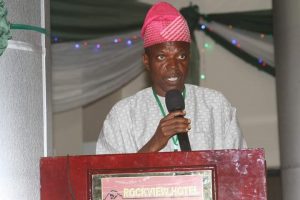The Broadcasting Organization of Nigeria (BON) has thrown its weight behind Nigeria advertising reform, stressing that it will revolutionize the industry and shield the media from unfair and unethical practices that have hindered the sector’s growth.
Dr. Yemisi Bamgbose, the Executive Secretary of BON, affirmed that the Advertising Industry Standard of Practice (AISOP) guidelines, which had encountered some resistance from Nigeria’s body of advertisers were unanimously approved through extensive consultations among all relevant stakeholders.
He made this announcement during a joint session with the Director General of the Advertising Regulatory Council of Nigeria (ARCON) and former President of the Independent Television Producers Association of Nigeria (ITPAN), Femi Odugbemi, on the morning show of the Nigerian Television Authority (NTA), recently.
Dr. Bamgbose stressed that many media stations are grappling with economic hardships stemming from extended payment periods and other unscrupulous practices within the advertising industry, yet they persevere in fulfilling their public obligations amid challenging circumstances.
“People are looking at it from the angle that ARCON is the one that is championing it. It should not be because it was a decision taken by the HASG and BON was represented. Let me state here that BON was part of that committee that was set up for the reform and also part of the HASG and was effectively represented in that committee.
“The media is only surviving because of the will to survive. It will not be an understatement that the media is already crippled. It is crippled because of the way other sectors are treating the media. Most media stations are just on air to fulfill their obligations and to ensure they perform their roles. If there is any sector that has been terribly battered in the ecosystem of advertising is the media. The media has suffered and it is suffering terribly in terms of payments for the services that they have rendered for advertisers and agencies” he added.
He clarified that the perception that ARCON is the sole proponent of this reform is incorrect and that BON played an integral role in the committee responsible for shaping the reform and was also a part of the Heads of Advertising Sectoral Groups (HASG), actively participating in this initiative.
In a related development, Femi Odugbemi, a renowned content producer and former President of the Independent Television Producers Association of Nigeria (ITPAN), has voiced his support for the latest advertising reform. He said the regulatory framework is a means to harness talent, promote economic development, and revitalize the local creative industry.

Odugbemi explained that encouraging brand marketers to produce TV commercials locally can have a ripple effect, generating jobs, supporting local talent, and fostering cultural representation. This approach, he noted also enables brands to better connect with the local audience, aligning with cultural nuances and preferences for more effective messaging.
Nigeria’s creative sector, he stressed, possesses immense potential, showcasing talent in various fields like storytelling, modeling/acting, photography, film, music, and production design. While challenges exist, including infrastructure limitations, there is a growing pool of skilled professionals. With the right investment, training, and collaboration, Nigeria’s creative sector can deliver high-quality productions that benefit both local and global marketing efforts.
Odugbemi emphasized,” This regulation also creates opportunity for made-in-Nigeria productions to once again find life. Just some five, ten years ago, hundreds of millions of naira were being used to make Nigerian commercials outside of Nigeria. What that met really was that actors, voice-over artistes, TV producers and TV production companies were actually going out of business steadily. I was President of the Independent Television Producers Association for four years. When I started as President, we were roughly 120 production companies whose principle business was supplying services for advertising. By the time I was leaving, because of the quantum of business that was been shifted out of the country, today there is less than 60 members of ITMANI mean surviving companies. So, for us, this regulation is not about what is been addressed, it is about what is been created”.
Commenting on the positive impact of the new regulation on skills development and capabilities, Odugbemi confirmed that there is an expansion of training and investment, affirming that all necessary production equipment is now available in Nigeria.

